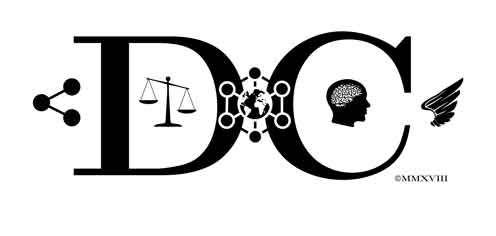Digital Civics draws from a rich interdisciplinary approach. Here are some ideas that have shaped the landscape of digital civics. This includes foundational documents on human rights (such as the Universal Declaration of Human Rights) the Philosophy of Information (as espoused by Luciano Floridi), an understanding of ethics for the digital age (as described in the work of Charles Ess), and historical context (such as Media Ecologists like Marshall McLuhan and Lewis Mumford).

- Clements, E. (2023). Exploring Digital Civics: a Framework of Key Concepts to Guide Digital Civics Initiatives. Philosophy & Technology, 36:21.
- Clements, E. (2020). A conceptual framework for digital civics pedagogy informed by the philosophy of information. Journal of Documentation, 76(2), 571-585
- Elwell, J. S. (2014). The transmediated self: Life between the digital and the analog. Convergence: The International Journal of Research into New Media Technologies, 20(2), 233-249.
- Ess, C. (2010). The Embodied Self in a Digital Age: Possibilities, Risks, and Prospects for a Pluralistic (democratic/liberal) Future? Nordicom Information, 32(2).
- Floridi, L. (2014). The Fourth Revolution: How the infosphere is reshaping human reality. Oxford University Press.
- Floridi, L. (2007) A look into the future impact of ICT on our lives. The Information Society, (23)1, 59-64.
- Floridi, L. (2002). What is the philosophy of information. Metaphilosophy, 33(1/2).
- Innis, H. (1950). Empire and Communications. Oxford: Oxford University Press.
- Jenkins, H. (2006). Convergence culture: where old and new media collide. New York: New York University Press.
- McLuhan, M. (1964). Understanding Media: The extensions of man. New York: Routledge.
- Mumford, L. (1934). Technics and Civilization. New York: Harcourt, Brace & Company Inc.
- Ong, W. (1982). Orality and Literacy, the Technologizing of the Word. London and New York: Methuen.
- Plato. The Phaedrus.
- Plato. The Republic.
- Rea, S.C. (2022), Teaching and confronting digital extremism: contexts, challenges and opportunities. Information and Learning Sciences. 123(1/2), 7-25.
- Silverstone, R. (2004). Regulation, media literacy and media civics. Media, Culture & Society, 26(3), 440-449.
- Ulansey, D. (2000). Culture Transition and Spiritual Transformation: From Alexander the Great to Cyberspace. In Singer, T. (ed.) The Vision Thing: Myth, Politics, and Psyche in the World. London & New York, Routledge, 213-31.
- UN General Assembly (1948). Universal Declaration of Human Rights, 10 December 1948, 217 A (III).
- Vallor, S. (2016). Technology and the Virtues: A philosophical guide to a future worth wanting. Oxford University Press.
Images:
Edited image, The book of Kells library interior, by Rene Cortin

